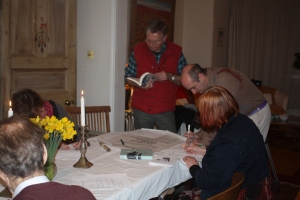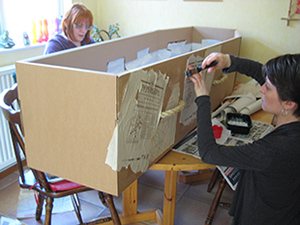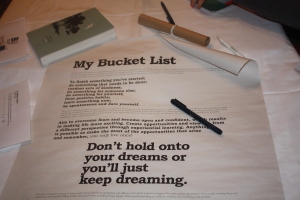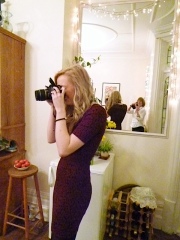Talking about death was always considered a taboo but as we start to question the meaning of life there is an increasing curiosity to explore the end. Sophie Marsden investigates a growing appetite to talk…
In the end we will all ‘kick the bucket’, ‘pop our clogs’ or ‘bite the big one’, Death is the one thing we can count on. But despite a variety of ways to say ‘you will die’ we get lost for words when discussing our own mortality. We instinctively distance ourselves from the subject by avoiding the discussion and even the word. This avoidance has become an art – we outsource where we can, leaving the crucial parts to an undertaker and whispered innuendo. We turn up at funerals dressed in black, offer our condolences and try our best to focus on conversations about life. How ironic. But there is a longing to airbrush the imperfections of the past with an increasing craving for a ‘pick ‘n’ mix’ of funeral choices and a more expressive approach to death.
Introducing a new trend, pop-up cafes where death is on the menu. Death Cafes offer a new way of making sense of the end – our own, our friends’ and our family’s, a place where strangers can meet to talk about death and dying. For those uninitiated, Death Cafes were inspired by the Swiss concept of ‘Café Mortal’, born out of the French ‘Philosophy Cafes’ that originated in the 20th century.
Inventor, sociologist Bernard Crettaz wanted to bring death into everyday conversation by holding discussion groups in public. Advocator of the British movement, Jon Underwood was inspired by his work and suggests that talking about death doesn’t have to be morbid. “It can be very liberating because the way our society shuts down conversations about death can be claustrophobic and stifling so I find that there is a feeling of relief and people talk with a real authenticity and passion, but with lots of laughter thrown in.” Jon held the first official British Death Café in the basement of his home in 2011. He felt there was a need for death education in Britain and has since inspired over 50 other events through a ‘how to’ guide on his website.
Lets talk about death
I joined a Death Cafe held by Josefine Speyer, psychotherapist and co-founder of the Natural Death Centre. Set-up in her decorative living room in a town house in central London, the elegant woman in her sixties greeted me with a warm smile. She tells me that her motto is to “embrace death as part of life” and stresses the importance of death education within society.
“It’s a bit like sex education, death education. It’s best to know all about it so you can aim for what you really want.”
Josefine suggests the problem is that we no longer feel that death is imminent. Advances in science now allow most of us to live past our eighties – a stark contrast to a century ago when you were lucky to make it to fifty. The latest ONS report revealed that death is in decline with 2011 marking the lowest death toll ever recorded in England and Wales. But death is still a part of our lives and people do die so what should we do if we want to talk about it? “Death Café is a wonderful way of inviting people from whatever level to approach it. Sometimes people don’t know how to talk about death because they haven’t been brought up to talk about it,” says Josefine. As a beginner in this death debate I shift in my seat nervously as eight strangers take their seats around me.
I was surprised at the diversity of those who attended. There were a variety of age groups, genders and, most importantly, an assortment of attitudes. Some had a background in the funeral industry and wanted to find a way to connect with bereaved families, others were there to try to come to terms with their grief by sharing stories of their deceased loved-ones. They spoke about rituals conducted to commemorate the dead, with many advocating a ‘new’ more personalised funeral and others remaining set on the traditional “cutting of the cord.” For many there was a sense of yearning, for a time when society hadn’t become so removed from death. One gentleman suggested that an undertaker’s purpose was to provide detachment. He said: “Taking the body away to be prepped behind the closed doors of the mortuary – out of sight and therefore out of mind.” Another women, Catherina Petit-van Hoey, suggested that the problem of outsourcing the care of our dead was that it stops us from dealing with death in a healthy way.
“In the past and in lots of other communities in the world, people care for the dead themselves, they prepare the body and help organise the funeral and in doing that we discover so much healing energy.”
New approaches
Catherina’s daughter, Kiama died suddenly of Lemierre’s syndrome in May 2012. The 22-year-old was due to graduate Norwich University of the Arts in the summer when she was admitted to hospital and later died. “We realised that she was a very creative person and hated things like black hearses and things like that, and there was no way we would have a traditional service,” said Catherina.
Instead they held a life celebration, decorating her coffin with Facebook tributes and cuttings of her artwork. They also rented a VW camper van to take the coffin to the crematorium – the van Kiama had dreamed of going travelling in. Catherina explained that it was therapeutic for her to do something with her hands and talked of how it helped her to re-balance her life. Catherina and her family are not alone. The funeral industry has seen an influx in more personalised do-it-yourself funerals with programmes such as BBC 2’s ‘Dead Good Job’ and Channel 5’s ‘Bizarre Burials’ showcasing our appetite for the weird and the wonderful funeral alternatives. There is also a growing popularity for younger people to create a ‘bucket list’ – a note of all the things you want to do before you die. The term stems from the phrase ‘kick the bucket’ and was made popular by the release of the film in 2007. New research shows that over half of those aged between 18-44 have already written one, are thinking about what to include in one or are planning to write one in the future.
Kiama’s family were surprised to discover a list she had written a year before her death, with her notes including “don’t hold on to your dreams or you will just keep dreaming” and as Catherina passed a copy around the table they no longer felt like strangers. Within the space of an afternoon we had laughed, debated and chatted, tackling the big life questions of how you will die? What funeral you would like? And whether we were all just plain strange for even talking about it? But as we all said our goodbyes it wasn’t death I was thinking about, it was life and how from now on I was going to make the most of it.





